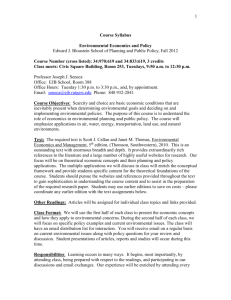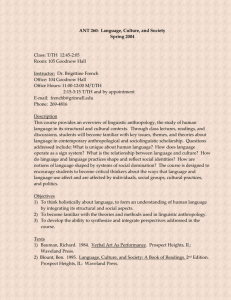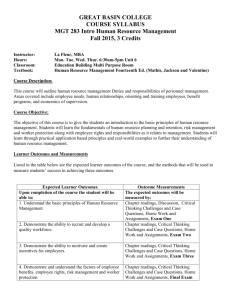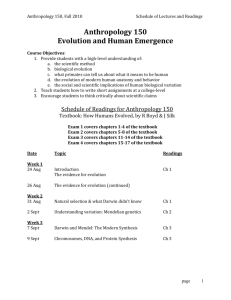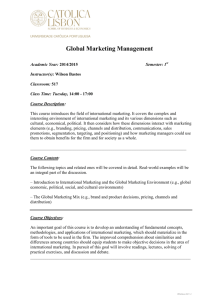Topic 5: Semiotic Approaches to Language and Culture
advertisement
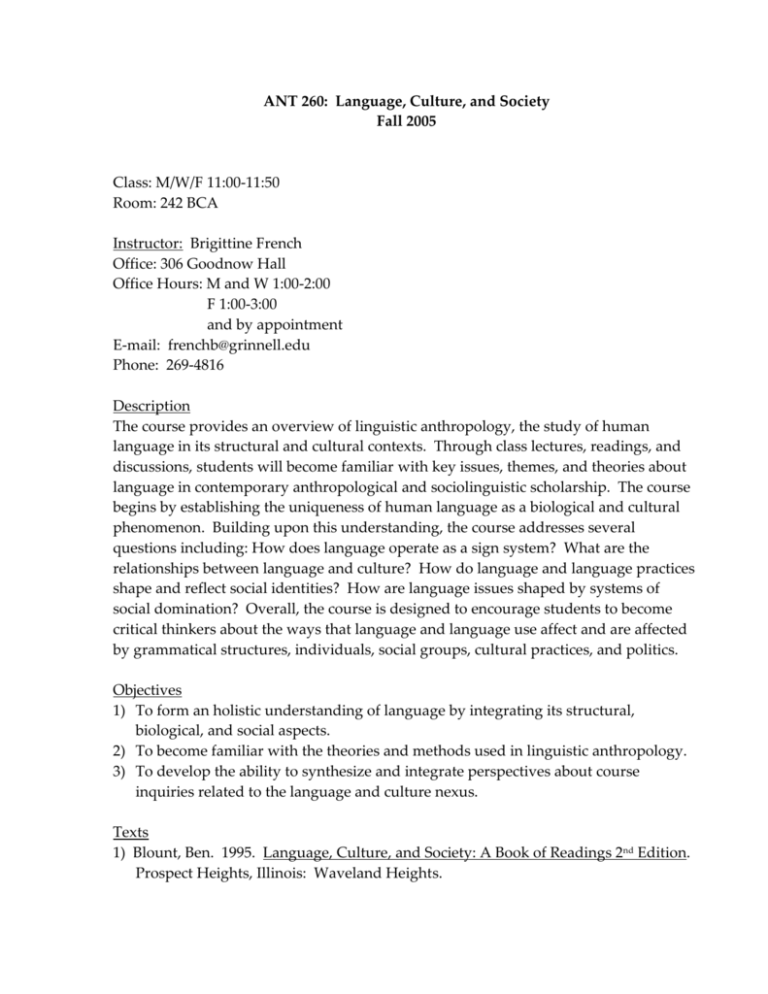
ANT 260: Language, Culture, and Society Fall 2005 Class: M/W/F 11:00-11:50 Room: 242 BCA Instructor: Brigittine French Office: 306 Goodnow Hall Office Hours: M and W 1:00-2:00 F 1:00-3:00 and by appointment E-mail: frenchb@grinnell.edu Phone: 269-4816 Description The course provides an overview of linguistic anthropology, the study of human language in its structural and cultural contexts. Through class lectures, readings, and discussions, students will become familiar with key issues, themes, and theories about language in contemporary anthropological and sociolinguistic scholarship. The course begins by establishing the uniqueness of human language as a biological and cultural phenomenon. Building upon this understanding, the course addresses several questions including: How does language operate as a sign system? What are the relationships between language and culture? How do language and language practices shape and reflect social identities? How are language issues shaped by systems of social domination? Overall, the course is designed to encourage students to become critical thinkers about the ways that language and language use affect and are affected by grammatical structures, individuals, social groups, cultural practices, and politics. Objectives 1) To form an holistic understanding of language by integrating its structural, biological, and social aspects. 2) To become familiar with the theories and methods used in linguistic anthropology. 3) To develop the ability to synthesize and integrate perspectives about course inquiries related to the language and culture nexus. Texts 1) Blount, Ben. 1995. Language, Culture, and Society: A Book of Readings 2nd Edition. Prospect Heights, Illinois: Waveland Heights. 2) Clark, Virginia, Paul Eschholz, and Alfred Rosa. 1998. Language: Readings in Language and Culture. New York: St. Martin’s Press. 3) Wogan, Peter. 2004. Magical Writing in Salasaca: Literacy and Power in Highland Ecuador. Boulder, Co: Westview Press. 4) Reserve readings. Available on Blackboard. Course Requirements: 1) Examinations: There will be two take-home exams. Exams will consist primarily of essay questions designed to address course materials covered in lectures, readings, videos, and class discussions. 2) Research Paper/Presentation: There will be one formal (ten page) paper. An annotated bibliography and class presentation will be due in conjunction with the paper. 3) Reading Response Papers: Each student will write a brief (one page single-spaced) response to a set of assigned readings and present it to the class for discussion. 4) Exercises: There will be three empirical exercises dealing with language due on the day indicated in class. 4) Attendance and Participation: Attendance and participation are essential to a successful class both individually and collectively. Be attentive and engaged. Question your ideas and those of class members including the professor. Grading and Evaluation Exam one Exam two Reading response Exercises Annotated bibliography Final paper presentation Final paper Participation 20 percent 20 percent 10 percent 10 percent 5 percent 5 percent 20 percent 10 percent 40 points 40 points 20 points 20 points 10 points 10 points 40 points 20 points Students with Disabilities: Anyone who has a disability that may require some modification of seating, testing, or other class requirements should inform me so that appropriate arrangements may be made. Please see me after class or during my office hours. Late Assignments No late assignments will be accepted without prior approval. Topic 1: The Nature and Culture of Communication F Aug 26 Course Introduction M Aug 29 Bolton, W. “Language: An Introduction” in Clark et.al. Daniels, H. “Nine Ideas about Language” in Clark et.al. W Aug 31 Fromkin et al., “The Development of Language in Genie” in Clark, et. al. Ochs, Elinor and Bambi Schieffelin “Language Acquisitions and Socialization” in Blount. F Sept 2 Blount, Ben. “Parental Speech and Language Acquisition: An Anthropological Perspective” in Blount. Topic 2: Langue: Structure, Description, and Analysis M Sept 5 de Saussure, F. Selections from A Course in General Linguistics in Reserve readings. STUDENT RESPONSE W Sept 7 Callary, Edward. “Phonetics” in Clark, et. al. F Sept 9 OSLF, “The Minimal Units of Meaning: Morphemes” in Clark, et. al. EXERCISES DUE M Sept 12 Henry, Frank. “Syntax: The Structure of Sentences” in Clark, et. al. EXERCISES DUE Topic 3: Language and Worldview W Sept 14 Sapir, Edward. "The Unconscious Patterning of Behavior in Society" in Blount. STUDENT RESPONSE F Sept 16 Whorf, B. "The Relation of Habitual Thought and Behavior to Language" in Blount. M Sept 19 Frake, Charles. "The Ethnographic Study of Cognitive Systems" in Blount. Lucy, John “Whorf’s View of the Linguistic Mediation of Thought” in Blount. STUDENT RESPONSE W Sept 21 Lakoff, George. “Metaphors of Terror” and “Metaphors that Kill” in Reserve readings. Topic 4: Ethnography of Communication F Sept 23 Edwards, P. "Speech Communities" in Clark, et. al. Hymes, Dell. "The Ethnography of Speaking" in Blount. STUDENT RESPONSE M Sept 26 Gumperz, John. "Linguistic and Social Interaction in Two Communities" in Blount. STUDENT RESPONSE W Sept 28 Goffman, Erving. "On Face-Work" in Blount. STUDENT RESPONSE F Sept 30 Ervin-Tripp, Susan. “Sociolinguistics” in Blount. STUDENT RESPONSE Topic 5: Semiotic Approaches to Language and Culture M Oct 3 EXERICES DUE Peirce, Charles. S. "Icon, Index, and Symbol" pp. 9-19 in Reserve readings. Mertz, Elizabeth. "Beyond Symbolic Anthropology: Introducing Semiotic Mediation" pp. 1-19 in Reserve readings. W Oct 5 Silverstein, Michael. "Shifters, Linguistic Categories and Culture Description" in Blount. STUDENT RESPONSE Topic 6: Orality, Literacy, and Expressive Culture F Oct 7 Video: Language You Cry In TAKE HOME EXAM ONE DUE FALL BREAK M Oct 17 Wogan, Peter. “Introduction” and “Witchcraft and Writing” in Wogan. STUDENT RESPONSE W Oct 19 Wogan, Peter. “Sources of Magical Beliefs” and “God’s Book” in Wogan STUDENT RESPONSE F Oct 21 Wogan, Peter. “The Day of the Dead,” “Weaving and Writing,” and “Conclusion.” In Wogan ANNOTATED BIBLIOGRAPHY DUE M Oct 24 Briggs, Charles and Richard Bauman “Genre, Intertextuality, and Social Power” in Blount. Topic 7: Language Variation W Oct 26 Hong Kingston, Maxine. "Finding a Voice" in Clark, et. al. Caldas and Caron-Caldas "Rearing Bilingual Children in a Monolingual Culture: A Louisiana Experience" in Clark, et. al. STUDENT RESPONSE F Oct 28 Video: American Tongues Marckwardt, A. and J. Dillard, “Social and Regional Variation” in Clark, et. al. M Oct 31 Labov, William. “The Study of Nonstandard English” in Clark, et.al. W Nov 2 Cukor-Avila, Patricia. “The Complex Grammatical History of AfricanAmerican and White Vernaculars in the South” in Reserve readings. STUDENT RESPONSE F Nov 4 Chun, Elaine. “The Construction of White, Black, and Korean American Identities through African American Vernacular English” in Reserve readings. STUDENT RESPONSE M Nov 7 Keenan, E. “Norm-Makers, Norm-Breakers: Uses of Speech by Mean and Women in a Malagasy Community” in Reserve readings. Tannen, D. "I'll Explain It to You" in Clark, et. al. STUDENT RESPONSE W Nov 9 Hall, Kira. “Lip Service on the Fantasy Lines” in Reserve readings. Topic 8: Political Economy of Language F Nov 11 Bourdieu, P. "The Economics of Linguistic Exchanges" in Reserve readings. M Nov 14 Hill, Jane. "The Grammar of Consciousness and the Consciousness of Grammar" in Blount. STUDENT RESPONSE W Nov 16 Hernandez-Chavez, E. “Language Policy in the United States: A History of Cultural Genocide?” In Reserve readings. STUDENT RESPONSE Topic 9: Language Endangerment, Loss, and Revitalization F Nov 18 Urdrich, Louise. “The Names of Women” in Clark et. al. Whittemore, Katherine. “Saving California Languages” in Clark et. al. STUDENT RESPONSE M Nov 21 French, Brigittine. “The Politics of Mayan Linguistics in Guatemala: Native Speakers, Exert Analysts, and the Nation” in Reserve readings STUDENT RESPONSE W Nov 23 Dorian, Nancy. “Western Language Ideologies and Small-Language Prospects” in Reserve readings. M Nov 28 STUDENT PROJECT PRESENTATIONS W Nov 30 STUDENT PROJECT PRESENTATIONS F Dec 2 TAKE HOME EXAM TWO DUE. M Dec 5 STUDENT PROJECT PRESENTATIONS W Dec 7 STUDENT PROJECT PRESENTATIONS F Dec 9 Course synthesis T Dec 13 FINAL PAPERS DUE IN MY OFFICE BY 12:00 PM.
